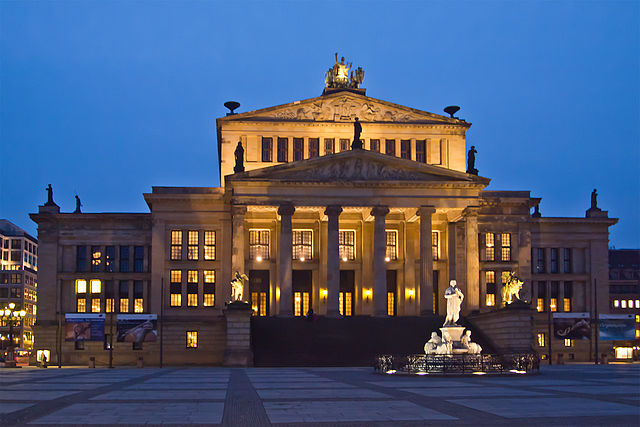Paul Frehner, composer
Overture 2000

The Berlin Konzerthaus, where Overture 2000 received its premiere, January 2000, by the Jeunesses musicales World Orchestra under Michel Tilkin. Photo credit: Pedelecs.
Program Note
In May of 1999 a friend informed me about the Jeunesses musicales World Orchestra’s Composers Competition for Overture 2000. I decided to enter this competition and to my delight my composition, Overture 2000, was awarded First Prize. As part of the prize it was premiered by the JMWO in the Berlin Konzerthaus just after midnight on January 1, 2000. It was a strangely eclectic program, beginning in the first half with Wagner’s Overture to the Meistersinger followed by Beethoven’s Symphony No. 5. During intermission everyone went outside to throw firecrackers and celebrate the countdown to the new millennium at the Brandenburg Gates. After intermission the orchestra resumed with my overture followed by Brahms’ Hungarian Dance No. 5, Tchaikovsky’s Polonaise from Eugene Onegin, Smetana’s Dance of the Comedian from the Bartered Bride and Ravel’s Bolero. After all that the audience wasn’t ready to call it a night and the orchestra played a number of Johann Strauss’s waltzes as an encore medley while people danced in the aisles. It was long enough to make a Springsteen concert seem short.
In Overture 2000 I was trying to capture and create a festive feeling. The vitality of the piece is inspired by flamenco guitar playing, which uses rhythmic techniques such as rasguado, a type of vigorous strumming, and tambora, a percussive effect achieved by striking the body of the guitar with the hand. I was also inspired by the Y2K virus, which threatened to wipe out computer systems worldwide but actually proved to be, in the words of Douglas Adams, mostly harmless. This ‘dire’ threat is represented by an increased fragmentation of the musical material toward the middle of the piece. After a slow middle section the fast-paced music gradually reintegrates or ‘defrags’ itself.